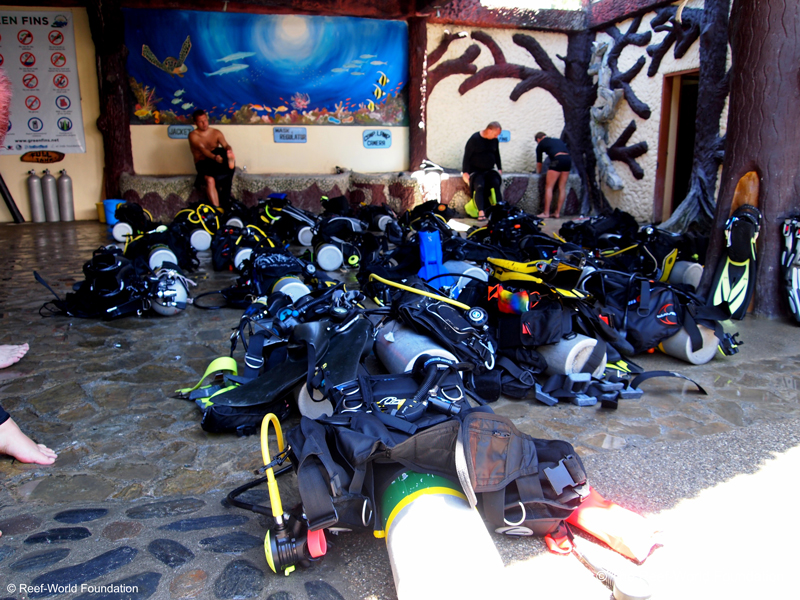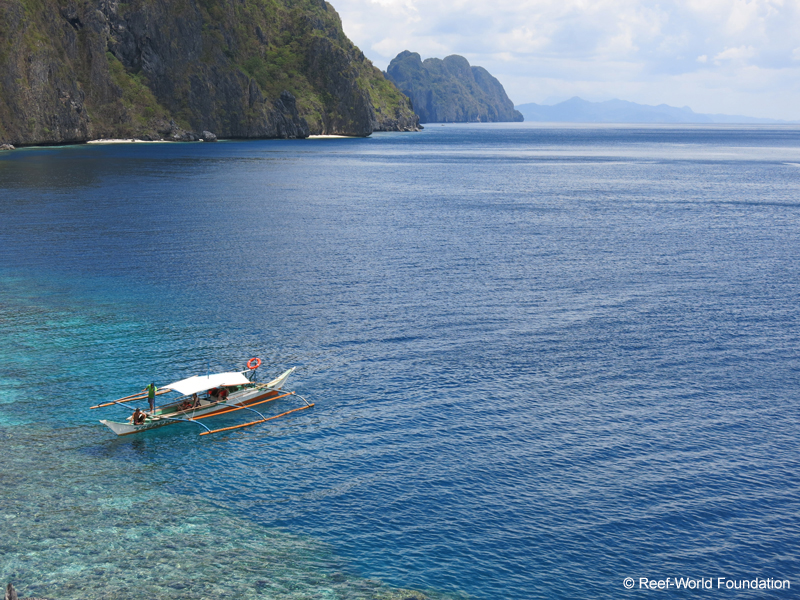By Samantha Craven and Chloë Harvey, The Reef-World Foundation
Tourism is one of the fastest-growing industries in the world, with well over a billion people traveling the globe recreationally each year, and the Asia-Pacific region has the fastest growing tourism sector of them all. With warm temperatures, interesting cultures and outstanding biodiversity, it’s no surprise. Tourism has brought numerous benefits to the region’s natural environment, as the industry provides alternative employment in areas that traditionally have relied on the exploitation of natural resources. Former fishermen are now dive guides and boat crew, and members of the community are employed in the related tourism services of hotels, restaurants and souvenir shops.
However, with the influx of new business comes great responsibility, both on the side of the operator and the diver. While diving obviously isn’t on par with large-scale threats like climate change, intensive diving tourism can drastically reduce a coral reef’s resilience in the face of growing environmental threats, such as climate change. Those of us who have seen big groups of divers or amateur photographers ploughing through the reef have felt the anguish of witnessing completely preventable destruction. Now multiply that by several dive groups on a dive site, several times a day, 365 days a year, and it all adds up.
For some of us, it’s a no brainer — you’re a visitor on the reef and you remember your manners. For others, especially some who were trained in temperate waters, it’s a case of not being aware. No one explained that coral is a fragile animal; no one explained that one touch can remove protective coatings and leave whole colonies susceptible to disease; no one explained the rules of the reef.
For dive operators, every day is a balance between customer service and safety and environmental protection. There aren’t many of us that like to be lectured while on vacation, and the power of the tourist dollar means that dive guides who see the damage to their business asset — the reef — often are left feeling hopeless and unable to correct a customer in fear of losing out on a much-needed tip or getting reprimanded by management.
The Green Fins Toolbox
Luckily, a bunch of divers and marine conservationists have been working for over 10 years, with dive centers in some of the world’s busiest tourist destinations, to collect the most useful and practical solutions to these common challenges. We’ve packaged them up into the Green Fins Toolbox, which was created to help dive shops enact the Green Fins standards, the world’s only internationally recognized environmental standards for the diving and snorkeling industry.
The Toolbox contains a host of educational posters for you to freely share and display, simple guides on best practices and environmental activities, and a series of operational handbooks offering step-by-step guidance on environmental standards for business managers, resource managers and decision makers.

As divers, what can you do?
- Be ocean literate. Once you start learning about the reef, it becomes even more alive and worthy of a little extra protection. Corals aren’t rocks; they are living, breathing condominiums for thousands of individuals. They are the barracks shared by reef species on day and night shifts. They are the salons for cleaner wrasse and the algal farmlands for damselfish. The barrel sponge is one animal; the sea whips are colonies of soft coral. The mantis shrimp can see colors we can’t even imagine and some nudibranchs take the stinging cells of their prey, and install them in their gills for defense. An index finger balancing on a boulder coral might be crushing ten coral animals, a fin kick breaking off a tiny piece of staghorn coral might be destroying years of growth. Once we understand the intricacies and complexities of a reef, we better understand how errant actions can cause damage.
- Learn your underwater manners. Become familiar with the do’s and don’ts of environmentally responsible diving. Green Fins offers materials free for download, including diving and snorkeling best practices. Take buoyancy courses and ask your guide to give you feedback on your form, or to hold you steady while you take a photo instead of leaning on the reef.
- Choose responsible operators. Choose dive shops that champion environmental protection and teach you about the reef. Find out if guides include environmental briefings, asking you not to touch or harass marine life. Make sure the operator offers suitable garbage cans and ashtrays that don’t add to the marine-debris problem. Green Fins-certified active members have had training, evaluation and consultation to improve their environmental practices. You can find the Top 10 Green Fins environmental dive centers in the world on the website as well.

As dive shops, what can you do?
- Be teachers of the sea. You can set the tone with your customers before they even book with you. Highlight your environmental rules on your website; add them to your liability form; and ensure that your guides repeat them during the briefings. Your staff members are role models for the guests. What they do and allow, the customers will copy. Any habits, good or bad, demonstrated by your staff may be mimicked for years to come by your customers on reefs around the world.
- Use the right tools. The newly released Green Fins Toolbox is a collection of materials created using over 10 years’ experience, working with over 400 dive centers. The toolbox allows dive shops to apply environmental standards without compromising their customer’s experience. From recipes for environmental cleaning products to posters meant to educate and engage your guests, to helping you protect the reefs, the Green Fins Toolbox houses a suite of free materials ready to download now.
- Become a Green Fins member. Green Fins members are dive and snorkel operators who have agreed to abide by the 15-point code of conduct and reduce their environmental impacts. They are supported annually by qualified Green Fins representatives, who assess compliance above and below the water, and provide training and recommendations to improve compliance to the code. Members are promoted online and throughout conservation and tourism networks. Membership is free and there are active assessor teams in the Philippines, the Maldives, Malaysia and Vietnam.If you aren’t based near an assessor team, you needn’t miss out – the Green Fins Dive Center Handbook is your guide to implementing best practices, created with the input of the dive industry, for the dive industry. A small fee of US $28/GBP£20 is required as a donation to the technical team at Reef-World, which is behind the Green Fins success.
Saving our reefs isn’t out of reach, despite the constant stream of bad news surrounding climate change and overfishing. Now is not the time to give up — now is the time to double-down on recovery, and the Green Fins toolbox can help. The latest science is demonstrating that coral reefs are incredibly resilient if they are given the chance to exist with fewer local direct impacts. That means every individual diver, snorkeler, dive or snorkel operator can make a real difference, especially with the actions we have daily control over. Take the time to get to know the toolbox, and begin bringing reefs back from the brink today.

